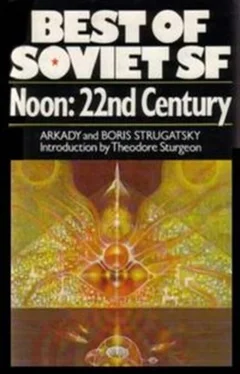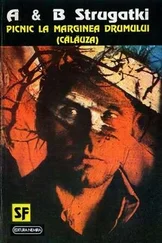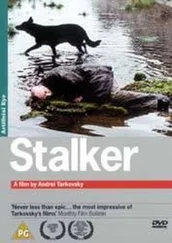“Gorbovsky is a man of phenomenal penetration,” said Mboga.
“Yes,” said Tanya. “It’s frightening to think what old Boris could have done if he’d had a gun.”
“Why single me out?” Fokin said angrily, “What about you? Who was it that went swimming with a hacker?”
“We’re all a fine bunch,” Ryu said with a sigh.
Komov looked at his watch. “Takeoff in twenty minutes,” he announced. “Stations, please.”
Mboga hesitated in the airlock and looked back. The white star EN 23 had already risen over the green plain. It smelled of moist grass, warm earth, fresh honey. “Yes,” said Mboga. “Really a planet with all the conveniences. Why did we ever think nature could have created anything like it?”
Part Four: What You Will Be Like
“You’re going to the island of Shumshu,” Fischer announced.
“Where is that?” Sidorov asked gloomily.
“The northern Kurils. Your flight leaves today at twenty-two thirty. A combined cargo-passenger run from Novosibirsk to Port Provideniya.”
They planned on testing embryomechs under varied conditions. Mostly the Institute did work for spacemen, and consequently thirty research groups out of forty-seven had been sent to the Moon and to various planets. The remaining seventeen were to work on Earth.
“All right,” Sidorov said slowly. He had hoped that they would assign him a space group, even if only a lunar one. It seemed to him that he had a good chance, for it had been a long time since he had felt as well as he had recently. He was in excellent shape, and had continued to hope up to the last minute. But for some reason Fischer had decided otherwise, and Sidorov couldn’t even talk to him man to man, since some glum-faced strangers were sitting in the office. So this is how Pm going to grow old, thought Sidorov. “All right,” he repeated calmly.
“Severokurilsk already knows,” Fischer said. “The exact site of the experiment will be decided in Baikovo.”
“Where’s that?”
“On the island of Shumshu. It’s Shumshu’s administrative center.” Fischer hooked his fingers together and started looking out the window. “Sermus is staying on Earth too,” he said. “He’s going to the Sahara.”
Sidorov was silent.
“So,” said Fischer. “I have already assigned you some assistants. You’ll have two of them. Good kids.”
“Greenhorns.”
“They’ll manage,” Fischer said quickly. “They’ve had good preparation. Good kids, I tell you. One of them, incidentally, has been an Assaultman like you.”
“Fine,” Sidorov said indifferently. “Is that it?”
“That’s it. You can start off, and good luck. Your cargo and your people are in One-sixteen.”
Sidorov started walking toward the door. Fischer hesitated, then called after him, “And come back soon, Kamerad. I have an interesting topic for you.”
Sidorov closed the door behind him and stood there a moment. Laboratory 116 was five stories below, he remembered, so he headed for the elevator.
An Egg—a polished sphere half as high as a man—was standing in the righthand corner of the laboratory, and two people were sitting in the left corner. They stood up when Sidorov came in. Sidorov stopped and looked them over. They were both about twenty-five, no older. One was tall, blond, with an ugly red face. The other was a little shorter, a dark, handsome, Spanish type, wearing a suede jacket and heavy climbing boots. Sidorov stuck his hands into his pockets, stood on tiptoes, and came down again on his heels. Greenhorns, he thought, and suddenly felt the attack of irritation so strong that he surprised himself. “Hello,” he said. “My name is Sidorov.”
The dark one showed white teeth. “We know, sir.” He stopped smiling and introduced himself: “Kuzma Sorochinsky.”
“Galtsev, Viktor,” said the blond one.
I wonder which of them was the Assaultman, thought Sidorov. Probably the Spanish-looking one, Sorochinsky. He asked, “Which of you was the Assaultman?”
“I was,” answered the blond Galtsev.
“Disciplinary?” asked Sidorov.
“Yes,” said Galtsev. “Disciplinary.” He looked Sidorov in the eye. Galtsev had baby-blue eyes and fluffy, feminine lashes. Somehow they did not fit in with his coarse red face.
“Well,” said Sidorov, “an Assaultman is supposed to be disciplined. Any person is supposed to be disciplined. But that’s water under the bridge. What can you do, Galtsev?”
“I’m a biologist,” Galtsev said. “A specialist in nematodes.”
“Right,” Sidorov said, and turned to Sorochinsky. “And you?”
“Gastronomical engineer,” Sorochinsky reported loudly, again showing his white teeth.
Marvelous, thought Sidorov. A worm specialist and a pastry cook. An undisciplined Assaultman and a suede jacket. Good kids. Especially this excuse for an Assaultman. Thank you, Comrade Fischer, you always take such good care of me. Sidorov imagined Fischer carefully and carpingly picking the off-planet groups out of two thousand volunteers, then looking at the clock, looking at the lists, and saying to himself, “Sidorov’s group. The Kurils. Athos is efficient, experienced. Three people will be quite enough for him. Two, even. It’s hardly the Hot Plateau on Mercury, after all. We’ll give him this Sorochinsky and this Galtsev. All the better, Galtsev has been an Assaultman too.”
“You’ve been briefed for this work?” asked Sidorov.
“Yes,” said Galtsev.
“I’ll say we have, sir,” said Sorochinsky. “We’ve got it coming out our ears!”
Sidorov went over to the Egg and touched its cold, polished surface. Then he asked, “Do you know what this is? You, Galtsev.”
Galtsev raised his eyes to the ceiling, thought a bit, and said in a monotone, “Embryomechanical device EM-8. Embryomech Model Eight. An autonomous self-developing mechanized system including: FMC program control—the Fischer mechano-chromosome; a system of organs of perception and action; a digestive system; and a power system. The EM-8 is an embryome-chanical device which is capable under any conditions of converting any raw material into any structure given in its program. The EM-8 is intended—”
“You,” Sidorov said to Sorochinsky.
Sorochinsky rattled off, “The present prototype of the EM-8 is intended for tests under terrestrial conditions. The program is standard program number sixty-four: the conversion of the embryo into an airtight residential dome for six persons, with hall and oxygen filtration.”
Sidorov looked out the window and asked, “Weight?”
“Approximately one hundred and fifty kilos.” General assistants for experimental groups could really get by without knowing any of this.
“Fine,” said Sidorov. “Now I’ll tell you what you don’t know. In the first place, the Egg costs nineteen thousand man-hours of skilled labor. In the second place, it really does weigh all of one hundred and fifty kilos, and you will haul it yourselves to where we need it.”
Galtsev nodded. Sorochinsky said, “Of course, sir.”
“Wonderful,” said Sidorov. “You can start right now. Roll it to the elevator and go down to the lobby. Then go to the storeroom and take out the recording apparatus. Then you can go about your own business. Be at the airport with all the cargo by ten o’clock p.m. Try not to be late.”
He turned and left. From behind came a heavy thud. Sidorov’s group had started carrying out its first order.
At dawn a cargo-passenger stratoplane dropped a pterocar with the group over the Second Kuril Strait. Very elegantly, Galtsev brought the pterocar out of its dive, looked around, looked at the map, looked at the compass, and immediately found his way to Baikovo—several rings of two-story buildings made of red and white lithoplast, stretching in a semicircle around a small but deep bay. The pterocar, wrenching its tough wings, landed on the embankment. An early passerby, a teenage boy in a striped sailor undershirt and canvas pants, told them where the administration building was. There the current administrator of the island, an elderly round-shouldered Ainu who was a senior agronomist, welcomed them and invited them to breakfast. After he had heard Sidorov out, he offered him a choice of several low knolls on the northern shore. He spoke Russian fairly clearly, although sometimes he hesitated in the middle of a word, as if unsure where the accent went,
Читать дальше












